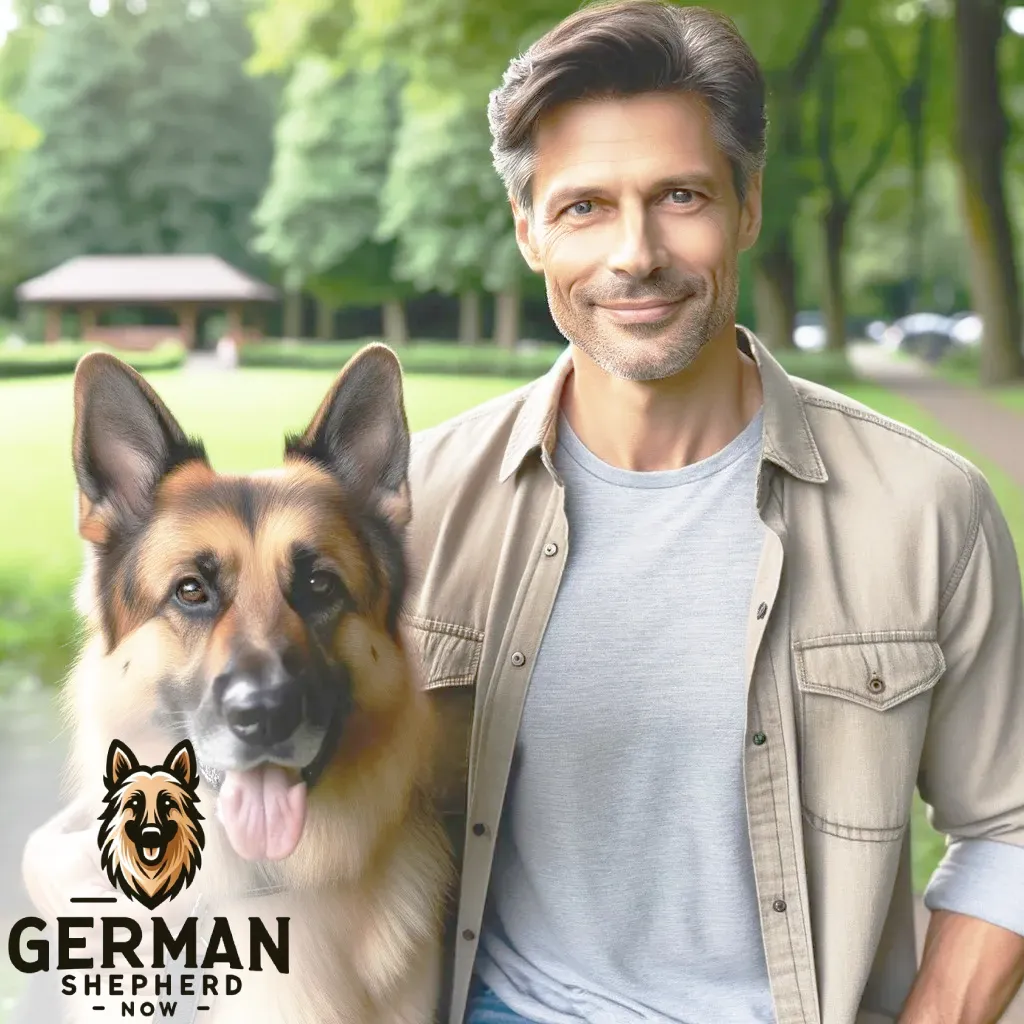Are German Shepherds Suitable for First-Time Dog Owners?

German Shepherds are great for first-time dog owners with time for training and making friends with their dogs. These smart dogs like to learn and make their owners happy. They do well with owners who can lead them well and set clear rules. Since they have a lot of energy, they fit best with people or families who are active.
New owners should also know that German Shepherds want to protect their homes and family. It’s important to help them meet new people and animals early on so they don’t become too protective. They are loyal and can do many things, making them wonderful pets. But they are big and strong, so they need an owner who wants to understand how to train and care for them well.
Suitability of German Shepherds for First-Time Dog Owners
German Shepherds are very popular dogs all over the world. They are smart, loyal, and can do many things. This makes them great pets, even for people who have never had a dog. But there are some important things to know.
It’s important to learn what German Shepherds need and how they act. This helps you and your new dog get along well.
Intelligence and Trainability
German Shepherds are super smart dogs. They are the third smartest dog breed, according to Dr. Stanley Coren. This means they can learn tricks and follow commands well.
But this smartness can be tricky if you’re getting a German Shepherd for the first time. Yes, it’s great because you can teach them rules and tricks. But these smart dogs also get bored if they’re not given something to think about. This can lead to them getting into trouble.
To keep them happy and out of trouble, it’s good to teach them new things often. Playing games that make them think or taking them to classes where they can learn new tricks are great ways to do this. This helps them stay busy and helps you and your dog become best friends.
Loyalty and Protective Instinct
One of the most cherished traits of German Shepherds is their loyalty to their family. They are known to form strong bonds with their owners and can be very protective. This loyalty and protective instinct make them excellent companions and good watchdogs.
Owners need to channel this protectiveness through socialization and training. Introducing your German Shepherd to various people, animals, and environments from a young age can help prevent overprotectiveness and ensure they are well-adjusted adults.
Energy and Exercise Needs
German Shepherds are a high-energy breed that requires plenty of exercise to stay healthy and happy. This makes them ideal pets for active individuals or families who enjoy outdoor activities. Daily walks, runs, and play sessions are essential for meeting their exercise needs.
For dog owners, this requirement can be an excellent motivator for leading a more active lifestyle. Potential owners should consider whether they can commit to providing this level of physical activity.
Size and Strength
The size and strength of German Shepherds can be intimidating to those unfamiliar with the breed. They are large dogs, with males weighing up to 90 pounds or more, and possess significant strength. While their size can make them effective deterrents against intruders, they also require a confident handler.
Owners must be prepared to establish and maintain leadership, ensuring the dog understands its place in the family hierarchy. Training in leash manners and obedience is essential to manage their size and strength safely.
Commitment to Grooming and Health Care
German Shepherds have a double coat that sheds year-round, with heavier shedding twice a year. Regular grooming, including brushing and occasional baths, is necessary to manage shedding and keep their coat in good condition.
Additionally, being aware of the breed’s health issues, such as hip dysplasia, and committing to regular veterinary care is crucial for maintaining their well-being. Owners should be prepared for the time and financial commitment required for proper grooming and health care.
Challenges of German Shepherds for First-Time Dog Owners
German Shepherds are renowned for their intelligence, loyalty, and versatility, making them one of the most popular breeds worldwide. Their characteristics and needs also present unique challenges that might not make them the ideal choice for first-time dog owners.
Below are several well-explained facts highlighting why German Shepherds might not be suitable for individuals new to dog ownership.
High Training and Socialization Needs
German Shepherds are intelligent and require consistent training and socialization from a young age. Their sharp minds mean they pick up on good and bad behaviors. For first-time owners without experience in dog training, managing a German Shepherd’s learning curve can be daunting.
These dogs thrive on structured training and positive reinforcement but may develop undesirable behaviors if training is inconsistent or lacks firmness and patience.
Significant Exercise Requirements
The breed is known for its high energy levels and stamina, which requires several hours of daily physical and mental stimulation. First-time dog owners might underestimate the commitment to keep a German Shepherd well-exercised and mentally engaged.
A German Shepherd can become restless without adequate exercise and exhibit behavioral issues such as excessive barking, digging, or chewing.
Strong Protective Instincts
German Shepherds possess a natural protective instinct towards their family and territory. While this trait can be beneficial, they can be wary of strangers and other animals if not socialized.
For those inexperienced with managing a dog’s protective behavior, this can lead to challenges in public spaces or when guests visit the home. Ensuring a well-adjusted German Shepherd requires a nuanced approach to socialization that might be challenging for first-time owners.
Potential for Health Issues
German Shepherds are prone to certain health conditions like many purebred dogs, such as hip dysplasia, elbow dysplasia, and degenerative myelopathy. Owners may find managing these health issues’ financial and emotional responsibilities overwhelming.
Preparing for potential long-term medical care is crucial for anyone considering adopting a German Shepherd.
Need for Space
German Shepherds are large, active dogs that thrive in environments with plenty of room to move around. They are not well-suited to apartment living or small spaces that don’t allow their physical energy to be expended.
Owners living in such environments might struggle to meet a German Shepherd’s space and exercise needs, leading to frustration for the dog and the owner.
Care Essentials for German Shepherds: For First-Time Dog Owners
German Shepherds are renowned for their intelligence, loyalty, and versatility, making them one of the most popular dog breeds worldwide.
Caring for a German Shepherd may seem daunting for a first-time dog owner, but understanding their specific needs can help ensure a healthy, happy life together. Here are key aspects of care to consider:
Nutrition and Diet
A balanced diet is crucial for your German Shepherd’s health. These active dogs require high-quality protein-rich food to support their muscular build and energy levels. Puppies, adults, and senior dogs have different nutritional needs, so it’s important to choose a diet that’s appropriate for their life stage.
Be mindful of their food intake to prevent obesity, which can lead to health issues like hip dysplasia—a condition German Shepherds are predisposed to.
Regular Exercise and Mental Stimulation
German Shepherds thrive on physical activity and mental challenges. They need daily exercise—such as walks, runs, or play sessions—to maintain their physical health and prevent boredom.
Mental stimulation can be provided through training sessions, puzzle toys, and activities that encourage them to think and solve problems. This not only keeps them physically fit but also mentally sharp and engaged.
Training and Socialization
Early and consistent training is essential for German Shepherds. Their intelligence and eagerness to learn make them trainable but require clear, consistent commands and positive reinforcement.
Socialization is important; exposing your dog to various people, animals, and environments from a young age can help prevent the development of fear-based behaviors and aggression, ensuring they grow into well-adjusted adults.
Healthcare and Grooming
Regular vet check-ups are vital to monitor your German Shepherd’s health, including vaccinations, parasite control, and dental care. They have a dense double coat that needs regular brushing to minimize shedding and prevent matting.
Bathing should be done as needed, but not too, to avoid stripping natural oils from their skin. Pay attention to their nails, ears, and teeth, maintaining a grooming routine that keeps them clean and healthy.
Creating a Safe Environment
Ensure your home and yard are safe and secure for your German Shepherd. They are known for their protective nature and may attempt to escape if they perceive a threat or are bored.
A fenced yard, safe toys, and a comfortable living space can help prevent accidents and injuries. Additionally, providing a designated area to rest and feel secure is important for their emotional well-being.
FAQs: Are German Shepherds Suitable for First-Time Dog Owners?
Bringing a German Shepherd into your home is a significant decision, especially for first-time dog owners. German Shepherds are known for their intelligence, loyalty, and versatility, but they also come with specific needs and challenges. To help you make an informed decision, here are the top 10 FAQs about whether German Shepherds are a good fit for first-time dog owners.
1. Can German Shepherds adapt to living with first-time dog owners?
Yes, German Shepherds can adapt well to first-time dog owners committed to learning about dog training, exercise, and care. These dogs respond well to consistent leadership and positive reinforcement.
2. Are German Shepherds easy to train?
German Shepherds are highly trainable due to their intelligence and eagerness to please. First-time owners should focus on positive, consistent training methods and consider enrolling in obedience classes for the best results.
3. Do German Shepherds require a lot of exercise?
Yes, German Shepherds are active and energetic dogs that require regular exercise to stay healthy and happy. Daily walks, playtime, and mental stimulation are essential for their well-being.
4. How are German Shepherds with children and other pets?
German Shepherds can be great with children and other pets if properly socialized from a young age. Supervising interactions and teaching children how to interact safely with dogs is important.
5. What are the grooming needs of a German Shepherd?
German Shepherds have a double coat that sheds year-round, requiring regular brushing. They’ll also need routine nail trims, ear cleaning, and occasional baths to keep them looking their best.
6. Are German Shepherds prone to any specific health issues?
Like any breed, German Shepherds are susceptible to certain health conditions, including hip dysplasia, elbow dysplasia, and bloat. Regular veterinary check-ups and a healthy lifestyle can help manage these risks.
7. Is it expensive to own a German Shepherd?
The cost of owning a German Shepherd can vary, but expect expenses for high-quality food, veterinary care, training, and grooming. Initial costs also include spaying/neutering and necessary supplies.
8. How do German Shepherds behave around strangers?
German Shepherds can be wary of strangers and have strong protective instincts. Proper socialization and training are key to ensuring they react appropriately in the presence of new people.
9. Can German Shepherds live in apartments?
While German Shepherds can adapt to apartment living, they thrive in homes with more space and access to a yard. Regardless of living space, sufficient exercise and mental stimulation are crucial.
10. What should I consider before getting a German Shepherd as a first-time dog owner?
Consider whether you can meet the breed’s exercise, training, and socialization needs. Reflect on your lifestyle, living arrangements, and willingness to invest time and resources into your dog’s well-being.
The Final Bark
Getting a German Shepherd can be great for first-time dog owners if they’re ready for the challenge. These smart, loyal dogs do best with owners who can give them lots of training, exercise, and chances to meet new friends.
They are strong and want to protect you, so you must guide them. But if you feed them right, keep them clean, and ensure they’re healthy, you’ll get along fine. German Shepherds are amazing friends for people who like to be active and want to work to train and care for them.

I’m Martin, and I grew up in the super cool city of Seattle. You know, the place with all the incredible mountains and forests? Yeah, that’s my playground!
Ever since I was little, I’ve been all about nature. I used to wander around the woods with a notebook, doodling all the cool plants and animals I’d find.
